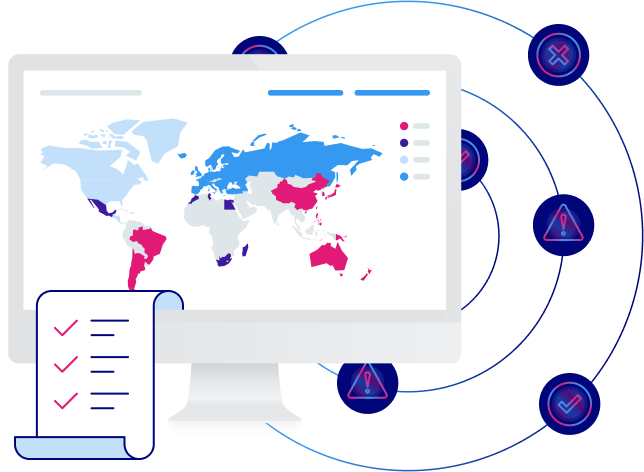-
Solutions
- AI Governance
- Geo-Specific Cookie Banner
- Consumer Preference Management
- Data Subject Request Automation
- Data Mapping and Vendor Risk Management
- Privacy, Vendor, and Risk Assessments
- Privacy Program Management
- Regulatory Guidance
- Privacy Program Consulting
- Certifications and Verifications
- International Data Transfers
Forrester TEI ROI of Privacy ReportTrustArc commissioned a Forrester study to analyze the potential benefits of using our platform and the Forrester team found ROI linked to efficiency, compliance, and decreased cost in data breaches.
Read the report -
Products Products Consent & Consumer Rights Overview
Experience automated privacy solutions that simplify compliance, minimize risk, and enhance customer trust across your digital landscape.
- Cookie Consent Manager Effortlessly manage cookie consent for global compliance, ensuring a secure, personalized browsing experience.
- Consent & Preference Manager Easily manage customer consent across brands and platforms—email, mobile, advertising—with a centralized repository.
- Individual Rights Manager Automate and streamline DSR workflows to ensure compliance and show your commitment to customer rights.
- Trust Center Quickly centralize, manage, and showcase all trust and safety information in an easily customizable, no-code hub.
Products Privacy & Data Governance OverviewSimplify privacy management. Stay ahead of regulations. Ensure data governance with cutting-edge solutions.
- PrivacyCentral Centralize privacy tasks, automate your program, and seamlessly align with laws and regulations.
- Data Inventory Hub & Risk Profile Gain full visibility and control of your data and accurately identify and mitigate risks.
- Assessment Manager Automate and score privacy assessments like PIAs and AI Risk, streamlining your compliance workflow.
- Nymity Research Get instant access to the latest in privacy regulations, legal summaries, and operational templates.
Products Assurance & Certifications OverviewBoost brand trust with TRUSTe's certifications, showing your privacy commitment with the most recognizable seal, assessed by unbiased experts.
- Dispute Resolution
- TRUSTe Enterprise Privacy Certification
- TRUSTe EDAA Privacy Certification
- TRUSTe APEC CBPR and PRP Certification
- TRUSTe Data Collection Certification
- CCPA/CPRA Validation
- Data Privacy Framework Verification
- GDPR Validation
- Digital Advertising Alliance Validation
- TRUSTe Responsible AI Certification
-
Regulations
- EU General Data Protection Regulation (GDPR)
- California Consumer Privacy Act (CCPA)
- Virginia Consumer Data Protection Act (CDPA)
- NIST AI Framework
- ISO/IEC 27001
EU Artificial Intelligence Act (EU AI Act)EU's regulation on the use of AI and the world's first comprehensive AI law.
Learn moreData Privacy Framework (DPF)Transatlantic data transfer mechanism for EU-U.S., UK, and Swiss-U.S. commerce.
Learn more - Resources
- Contact us
Colorado Privacy Act (CPA)
The Colorado Privacy Act is Colorado’s statewide privacy law that grants Colorado consumers new rights with respect to their personal data. It outlines the responsibilities and privacy protection requirements for covered organizations.
Are you subject to the Colorado Privacy Act?
The Colorado Privacy Act applies to organizations doing business in Colorado or delivering commercial products or services that are intentionally targeted at Colorado residents and meet one or both of the following criteria:
-
Control or process personal data of 100,000 or more consumers in a calendar year.
-
Derive revenue or receive a discount on the price of goods or services from the sale of personal data, and processes or controls personal data of 25,000 or more consumers.
Obligations & rights under the Colorado Privacy Act
This data privacy and protection law requires organizations to provide control and transparency to Colorado residents on how their personal information is collected, sold, and disclosed.Consents & opt-outs
Organizations must obtain the consumers’ consent through a webpage, application, or similar method before data processing and allow the consent to be revoked as easily as it was given. Follow required technical specifications for opt-outs of targeted advertising, sale of personal data, and profiling. The opt-out mechanisms must be provided in a clear, conspicuous, and readily accessible location outside the privacy notice. Under the Colorado Privacy Act, opt-out mechanisms must be recognized by organizations as valid consumer requests beginning July 1, 2024.
Policies & notices
Organizations must provide consumers with a reasonably accessible, clear, and meaningful privacy notice, that includes the categories of personal data collected, the purposes of data processing, and instructions for consumers to exercise their rights. If the organization sells personal data to third parties or processes personal data for targeted advertising, the privacy notice must include information on an individual’s right to opt out of the sale of personal information or of targeted advertising.
Data subject rights & requests
Consumers are entitled to access, correct, delete, and exercise data portability rights without requiring them to create new accounts. Organizations must respond to data subject rights requests within 45 days of receiving the request.
Data protection assessments
Organizations must conduct and document a Data Protection Assessment of each processing activity that presents a heightened risk of harm to consumers, this includes processing data for the purposes of targeted advertising, selling of personal data, and processing sensitive data.
Vendor management
Organizations must execute vendor contracts in order to meet their required obligations, establish a clear allocation of vendor responsibilities, and conduct regular vendor audits.

The Ins and Outs of the Colorado Privacy Act
The Colorado Privacy Act (CPA) was passed on July 8th, 2023. Get an in-depth brief on the definitions and requirements under the CPA and how to implement a compliant response program for consumer requests.
Achieve compliance
-
Protecting personal or sensitive data Automate with Data Inventory Hub. Save time and reduce risk with automated data flow mapping, risk analysis, and remediation for personal data processes and general activities.
-
Mitigating risks with vendors Mitigate risks with TrustArc’s Assessment Manager. TrustArc’s Risk Profile reviews specific risk variables, scores, and recommends necessary risk assessments (e.g., PIA and DPIA) for a mitigation plan. Use pre-built assessments and data mapping to map and track PI, SPI, and Vendor risk.
-
Exercising individual rights Enjoy DSR automation with Individual Rights Manager. Easily operationalize individual rights according to specific jurisdictions, leverage automated workflows to save time, and keep an audit trail of requests/actions.
-
Demonstrate CPA compliance Identify gaps and track compliance with PrivacyCentral – assess regulation specifics and automatically provides guidance on building out a sustainable privacy program.

The information provided does not, and is not intended to, constitute legal advice. Instead, all information, content, and materials presented are for general informational purposes only.




